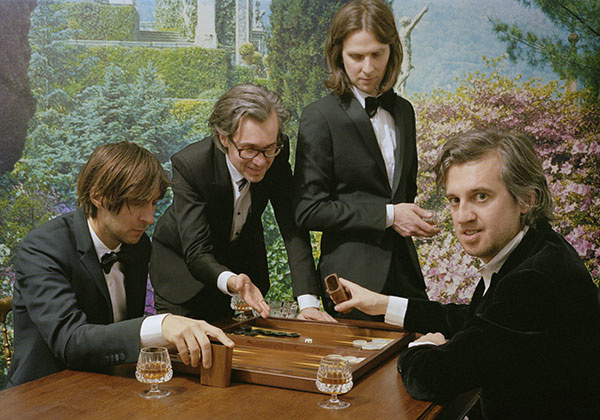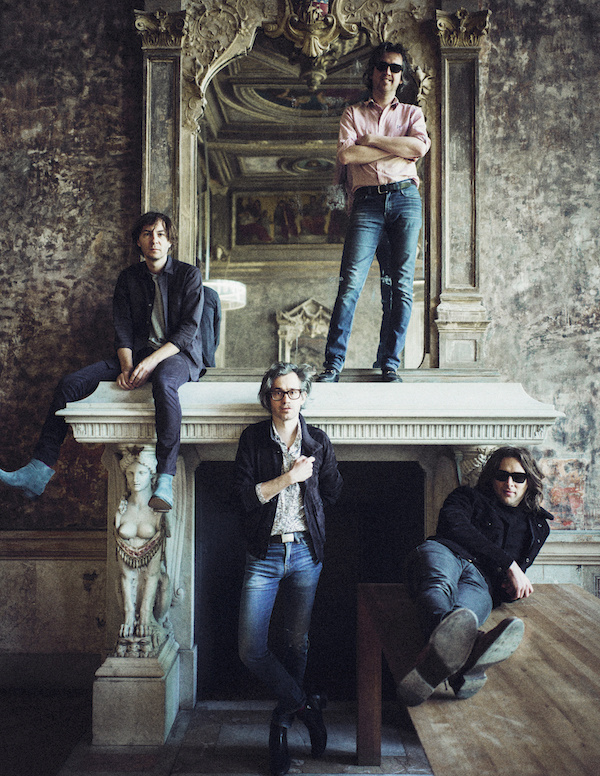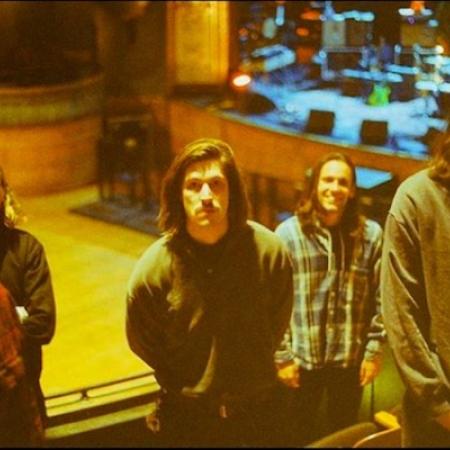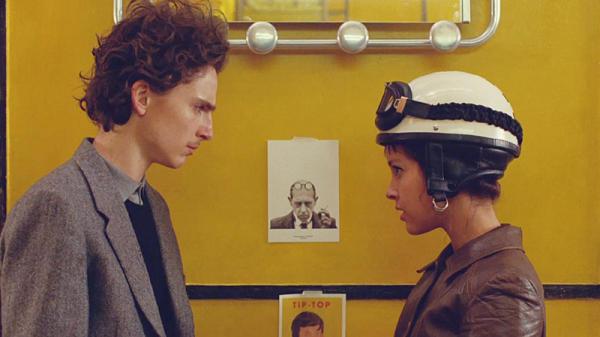Ahead of their performance at Auckland City Limits just a few weeks ago, we spoke on the phone with Phoenix’s Thomas Mars about coming to New Zealand for the very first time, the hard job of choosing songs for their set-list, and more…
If someone comes to New Zealand and he hates reggaeton and he thinks it’s the base of every evil, he can erase all reggaeton with just one click - and it's pretty scary to think that there is great music by artists that have really questionable behaviours, but their music should not be erased, you know?

COUP DE MAIN: Hi Thomas! Happy Birthday for last week - did you have a good birthday?
PHOENIX - THOMAS MARS: No, it was terrible, I was by myself on a plane, but it's fine, we're used to it. I was going to Belgium. <laughs>
CDM: Are you looking forward to playing in New Zealand for the first time ever with Auckland City Limits?
THOMAS: Yeah. We've never played there ever so that's incredibly lucky for us and we’re just thinking about the setlist. When we started music, we were asked to play a show in London as kids at a small pub, and all the London influencers came. It was our first show, so we were awful and not ready, and everybody was disappointed and it gave us a really slow start. We still had faith in us, but it felt like there were too many important people watching our first show which was wrong. This is the opposite [playing Auckland City Limits], we must have played like 2,000 shows and we have giant production that is coming with us. We are prepared, it's going to be so much easier compared to the London show. I like that idea of the contradiction between our first show and this show and I'm looking forward to it - it's a rare thing that you don't go to a country for that many years and with that many records and it's our first time. We experienced the same thing in Peru last week when we played there for the first time and it was really, really special, so I'm sure it's going to be at least as good.
CDM: I saw you guys play at Governors Ball Festival in New York earlier this year, and the show was amazing - I particularly loved the mirror that works as your stage backdrop. What inspired that stage design?
THOMAS: That idea of a mirror that is 45 degree angled on top of the stage is from the 1920s in Paris - that’s the earliest picture I found. It was a picture I had found from the late 20s from a French Can-can show where I think the idea was that they were frustrated that people were just looking at the legs of the dancers and not at the perfect circles that the dresses would make. One of the tricks was that while women were throwing their legs up and down they were keeping a perfect circle-shaped dress and so they wanted people to realise that and see that, so they put the mirror there, and I think that is the earliest. For us, I always wanted a screen. As a kid, I would watch ‘Billie Jean’ and I wanted to walk on the-- I think everybody wanted to feel what it would feel like if you would walk on a floor and it would light up, and it was the same idea, but then if you have a screen on the floor, no-one sees it, so we thought if we put a mirror then somehow it would be trapped in the middle and it would have a sort of mystique, a sort of additional layer. So that was the idea.
CDM: You obviously have an enormous back-catalogue of music, how do you go about putting together your set-list for a festival setting?
THOMAS: Our setlist is the only thing we fight about. <laughs> We never fight about anything, we did fight when we were 14, we fought for about two years straight, all of us just fighting non-stop and then we got it out of our system and we never really fight now. Our setlist is the only thing we fight about because it's the only time where we don't want to disappoint people. When we are recording an album it is just on us, you know? We are all trying to impress each other, I'm trying to impress the other three, and they are trying to impress the other three, so it's a healthy pressure. But when we play a festival we are all scared of… Last week I met someone at the airport who cried and said, 'Can you please play that song?' Like they wanted to hear a song from the new record that is called 'Telefono' and we weren't meant to play that song because we need to bring certain equipment to play that song and we didn't bring it, so when you see someone where they came to the airport to tell you that they need to hear this song, you have to play it otherwise you feel like your whole karma and everything is going to be… <laughs> So the setlist is all these small details, it’s anything that happens to us that day of the show - if Christian [Mazzalai] our guitar-player sees someone and says, 'We need to play this song! They told me to play this song.’ But most of it is always the new stuff because that is what keeps us going, so it’s always the last record, at least the last two or three records are the most and then a few of the first ones, but it's always the new stuff that gets us going.
CDM: You made special ‘Ti Amo’ jackets that you’ve been selling on tour, and on the last album you also made Phoenix jackets with the rainbow design. I always think you guys have the best merch! Who comes up with your merch ideas, and do you find it an important part of the band?
THOMAS: Thank you! The rainbow jacket is an idea that the directors that did the 'Trying To Be Cool' video had. They're called CANADA and we stole the idea from a jacket that exists which has a Lucifer logo on it, it's the same as the Phoenix jacket, but has the Lucifer logo on it. So they made these jackets and instantly it became a very popular thing without us knowing. People started making their own and it became something that people really wanted. For merch it's a strange love/hate relationship, because there’s only a few people that want special merch that you really care about. Most of the people want just a black t-shirt with the logo, something that is kind of obvious, and I understand why - to be part of a group or a family. But that's why we created the vending machine that we bring with us where we can have really weird and small things, like we can only make ten of something really strange and sell it in the vending machine and someone will want to get that. Most of the ideas we come up with, I don't think it interests anyone other than us. <laughs>
CDM: Just making stuff so that you guys can wear it yourselves.
THOMAS: Yeah!

CDM: My colleague wanted to ask you guys to make the Super Mercato jackets - I think Christian wore one?
THOMAS: Yeah! That's kind of like a heavy-duty jacket. We made some when we played a show in L.A. at the Hollywood Bowl and we produced a few, and even though it's really warm in L.A., people all bought the jackets. We made a few of those because it's almost like a painter's jacket, heavy-duty. For us, once the album is made, everything else is the fun part - you make the album cover, we make the music videos ourselves, we make the merch, and there's always things that we have ideas for too.
CDM: You’ve released the ‘Ti Amo Diaries’ on cassette tape, which is described as “60 sketches from the Ti Amo sessions.” Is this the first time you’ve released something like this?
THOMAS: It's kind of a bit of a tradition because we started doing it on ‘Wolfgang Amadeus Phoenix’ and the idea is to burn the bridges - that once a record is done, the best thing that can happen is that it's successful, and it's the worst thing as well, because if it's successful then a lot of people and record companies and people working with you-- The easy thing is to make the same thing. A lot of people want more of the same thing and by giving these away, we are giving away all the material that could be used to create more of the same thing in a record that would be next. It's a way to destroy... not to destroy, but to show small ideas of what they could have become, because some of these songs that don't make it on the record, they are inspiration for a song that did make it on the record. It's also a way for us to make sure that the next record would be something totally different. On ‘Bankrupt!’, I think we gave 100 demos away. We gave almost everything we had because we didn't want to use that as the base to write a new album. It is just making sure that each album is really different and is really a reaction to the previous one, not inspired by the previous one. It’s a way to stay healthy and sane and not do more of the same thing.
CDM: It’s a cool way for the fans to see the process of your album creation.
THOMAS: Yeah, sometimes what is strange is that some songs that are demos are really charming, because sometimes the low quality recording-- there is something about the first take that makes it impossible to reproduce the charm of the demo. Sometimes it feels that we can't really take the demo anywhere else, so we just decide to release that instead of ruining the first inspiration and trying to overproduce something that was just a simple idea.
CDM: You’ve been a band for coming close to 20 years now, which is so impressive. What have been the most obvious changes to the music industry since you began as a band?
THOMAS: It seems that the music industry always has the same demon. Whenever a new technology comes along, whether it was radio after cassette or… We came at the age of the CD but it all changes the music and usually it doesn't change the music for the best. Every time people try to fit in. When it was the CD, suddenly you could put music on for 74 minutes, so people made these super long albums that had awful interludes and they were really hard to listen to as a whole thing. When it was vinyl, you needed to have a very restricted amount of time on the vinyl otherwise the quality and the sound, you would ruin it. You had to tailor the length of your album to make sure that it had a good sound. Now with streaming it is almost that the album is a bit threatened. I think there is something great about streaming where you have access to an incredible amount of music, a lot of people have access to that, and that's incredible. It doesn't have to be depending on who is going to play you at the radio - just one guy who is going to decide if he is going to play you or not, there’s freedom about this that is incredible. The sad thing is that an album is the same way that a book is a story, there is more complexity and there is more depth and there is more reward in an album than playlists or a song. There’s also something scary about, in French we call them-- you know when the Nazis would burn all the Jewish books. The act of burning books, of destroying a whole culture, and now today you could have a digital terrorist attack where you can erase if you don't like someone's work. If someone comes to New Zealand and he hates reggaeton and he thinks it’s the base of every evil, he can erase all reggaeton with just one click - and it's pretty scary to think that there is great music by artists that have really questionable behaviours, but their music should not be erased, you know?
CDM: Earlier this year when I last interviewed you, you spoke about reading Volatire’s ‘Candide’ and ‘The Great Gatsby’, and the outside perspective that their characters have. What have you been reading lately?
THOMAS: New books or old books?
CDM: Anything that you've been reading!
THOMAS: There was one, it is such a classic, it's about the history of punk music in New York City and it's by... It’ll come back to me… There is a French writer that I love, I'm sad because I just finished his book, well it's the last-- I've read all of his books and that was the last book he wrote so unless there was something he wrote that I haven't discovered, there was a feeling of sadness because that is it, there is no more. I guess I can re-read, but his name is Romain Gary, he has always had a special place in my heart. The punk book about New York City is called 'Please Kill Me' by Legs McNeil and it’s basically the story of this dude who is Iggy Pop, The Velvet Underground, it’s a real insider, it's not something that you've read before, it is very raw and it is very inspiring. It is something very far from ‘The Great Gatsby’ for sure. <laughs>
Phoenix’s album ‘Ti Amo’ is out now - click here to purchase.
Watch the ‘Ti Amo’ music video below…



 Phoenix
Phoenix







